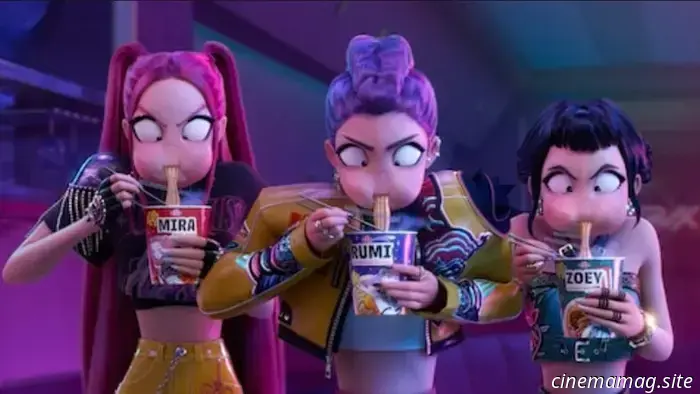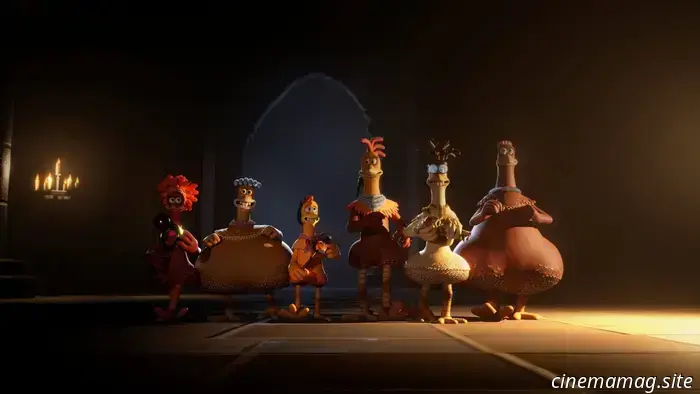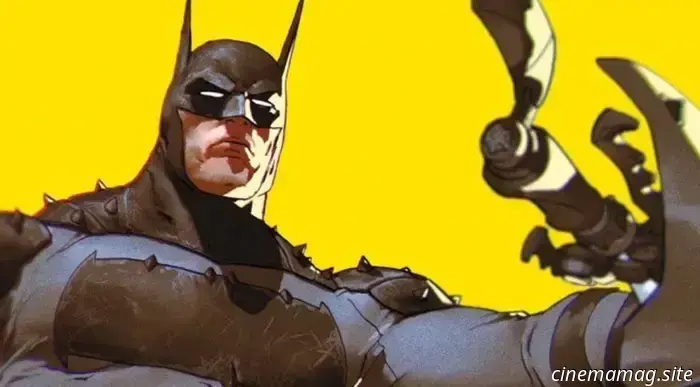
KPop Demon Hunters creator Maggie Kang is proudly "Driven by Fear."
Maggie Kang, the creator and co-director of KPop Demon Hunters, recognizes that feeling a bit frightened often indicates she’s on the right creative path.
“I believe you should feel scared when presenting new ideas because that signifies originality and innovation,” she shares with MovieMaker. “I hope we witness more unique creative endeavors where artists are encouraged to fully express themselves.”
The animated sensation, which Kang co-directed alongside Chris Appelhans, a veteran of Wish Dragon, has become Netflix’s most successful film ever, amassing over 325 million views. This is merely one record the film has shattered: its theatrical sing-along release in August marked Netflix's first ever top box office position, while the hit single “Golden” topped the Billboard charts for weeks.
This musical action comedy, produced by Netflix and Sony Animation, follows the K-pop trio Huntr/x—comprising Rumi, Mira, and Zoey—who also serve as demon hunters. The movie combines anime-inspired visuals with catchy songs and humorous moments, such as Mira and Zoey repeatedly chanting “couch couch couch” while craving rest after touring. The theme of friendship among the girls endures, even in challenging times.
Kang explains, “There was this persistent desire to depict a different type of female superhero—one who is silly and unafraid to appear foolish, who enjoys eating, and constantly strives to be humorous. That’s a reflection of my own personality. I wanted to create that kind of female character and set that tone for all the girls.”
Specifically regarding Rumi, Kang notes that they were keen on exploring themes of demons, both external and internal, and how Rumi embodies this duality. “Portraying her as a literal demon allowed for a playful element as the main character who faces burdens but also discovers humor within herself, preventing her from being overly serious—something that could be tedious for the main character. The ‘couch, couch, couch’ scene had various purposes, with one being to showcase her silliness before delving into her deeper emotional struggles.”
Moviemaker: Chris, how did you become involved, and what was your co-directing partnership with Maggie like?
Chris Appelhans: I had just completed Wish Dragon and was ready for a long break. Then Aron Warner, who initially introduced this project at Sony with Maggie, said, “You should check this out; it’s right up your alley.” Upon meeting Maggie, I was trying to play it cool, but within minutes I thought, “This idea is fantastic—this person has great taste.”
Personally, I was looking for a way to make a music-themed movie that wasn’t a traditional musical, and I hadn’t found a concept that resonated with me. This was a fantastic opportunity to explore the pop music format while telling a story without losing its vibrant essence, which often happens in other projects.
The collaboration was an excellent blend of our interests, and I found our partnership remarkably smooth—we effectively shared the same vision for the film. There are qualities in a partnership that benefit from a common vision, but Maggie brought elements to the girls' relationships, comedy, and emotional depth that I couldn’t have contributed.
Maggie Kang: It reached a point where one of us could be away, and we felt confident enough to make decisions autonomously, knowing the other held the same intentions.
Chris Appelhans: Even during the writing phase, we exchanged Final Draft files back and forth. It always appeared as if whichever was missing from the scene, the other person would have a different perspective on it.
Moviemaker: When the film was initially announced, it fell under Sony Animation’s more mature category. Was there a point when it was darker before it shifted towards a more family-friendly tone?
Maggie Kang: Yes, it was once darker, even before Chris joined. My intention was never to create something excessively dark or adult, similar to something like Blue Eye Samurai. That show is fantastic, but my inclination is always toward humor and light-heartedness. I’m sure there exists a film that successfully merges both, but that wasn’t my aim. The tonal balance we achieved is precisely what I wanted from the outset.
Moviemaker: Can you discuss how you selected the singers and voice actors who correspond to the girls? There seems to be a seamless blend with two voices for one character.
Maggie Kang: [Laughs] It wasn’t really a structured plan.
Chris Appelhans: We spent ample time casting the voice and singing parts. In animation, we dedicated ourselves to understanding the characters through writing and temp recordings, screening the film several times. By the time we reached the casting stage, we deeply understood who Rumi, Mira, and Zoey were. We could select the right actors and singers and communicate clearly about each character’s inner thoughts. This was crucial so that when performers like Rei Ami or Audrey Nuna sang, they were aligned with



Other articles
 The Age of Revelation continues next week with the release of Expatriate X-Men #1 by Marvel Comics, and you can get a sneak preview of the issue below with the official preview…
X YEARS LATER, like the fallen and reassembled United States, a new team consisting of MS. MARVEL, BRONZE, MELEE, and RIFT emerges! They have taken control of the waters of the Mississippi River, which separate mutantkind from humanity. Feared and strong, their guerrilla strategies maintain their dominance—until a high-stakes mission to retrieve a valuable asset threatens to fracture them. Will they be able to stay united when everything is at stake?
Expatriate X-Men #1 will be available for purchase on October 29th, with a price of $3.99.
About Amie Cranswick: Amie Cranswick has been a member of Flickering Myth’s editorial and management team for over a decade. She has a background in publishing and copyediting and has been Editor-in-Chief of FlickeringMyth.com since 2023.
Outright Games and Aardman have unveiled the launch of Chicken Run: Eggstraction, their latest stealth action-adventure game that picks up from their successful 2023 film, Chicken Run: Dawn of the…
The Age of Revelation continues next week with the release of Expatriate X-Men #1 by Marvel Comics, and you can get a sneak preview of the issue below with the official preview…
X YEARS LATER, like the fallen and reassembled United States, a new team consisting of MS. MARVEL, BRONZE, MELEE, and RIFT emerges! They have taken control of the waters of the Mississippi River, which separate mutantkind from humanity. Feared and strong, their guerrilla strategies maintain their dominance—until a high-stakes mission to retrieve a valuable asset threatens to fracture them. Will they be able to stay united when everything is at stake?
Expatriate X-Men #1 will be available for purchase on October 29th, with a price of $3.99.
About Amie Cranswick: Amie Cranswick has been a member of Flickering Myth’s editorial and management team for over a decade. She has a background in publishing and copyediting and has been Editor-in-Chief of FlickeringMyth.com since 2023.
Outright Games and Aardman have unveiled the launch of Chicken Run: Eggstraction, their latest stealth action-adventure game that picks up from their successful 2023 film, Chicken Run: Dawn of the…
 Hot Toys introduces a new sixth scale figure of Han Solo from Star Wars: Episode V – The Empire Strikes Back.
Hot Toys has revealed its latest sixth scale figure of Han Solo, capturing the likeness of Harrison Ford as the smuggler-turned-Rebel hero in Star Wars: Episode V – The Empire Strikes Back; check it out…
Hot Toys introduces a new sixth scale figure of Han Solo from Star Wars: Episode V – The Empire Strikes Back.
Hot Toys has revealed its latest sixth scale figure of Han Solo, capturing the likeness of Harrison Ford as the smuggler-turned-Rebel hero in Star Wars: Episode V – The Empire Strikes Back; check it out…
 10 Must-Watch Contemporary Survival Horror Films
Vanessa Maki presents 10 must-see survival horror films for your viewing list… In many horror movies, the main objective is to endure the terrifying events that are taking place. The characters may not succeed in…
10 Must-Watch Contemporary Survival Horror Films
Vanessa Maki presents 10 must-see survival horror films for your viewing list… In many horror movies, the main objective is to endure the terrifying events that are taking place. The characters may not succeed in…
 Sneak Peek – Absolute Batman 2025 Annual #1
DC Comics is set to release Absolute Batman 2025 Annual #1 next week, and you can catch an early glimpse with the official preview provided below; take a look… Some of the top names in comics contribute to a…
Sneak Peek – Absolute Batman 2025 Annual #1
DC Comics is set to release Absolute Batman 2025 Annual #1 next week, and you can catch an early glimpse with the official preview provided below; take a look… Some of the top names in comics contribute to a…
 Comic Book Sneak Peek – Expatriate X-Men #1
The Age of Revelation will carry on next week when Marvel Comics publishes Expatriate X-Men #1. You can find an official preview of the issue below for an exclusive first look... X YEARS LATER, similar to...
Comic Book Sneak Peek – Expatriate X-Men #1
The Age of Revelation will carry on next week when Marvel Comics publishes Expatriate X-Men #1. You can find an official preview of the issue below for an exclusive first look... X YEARS LATER, similar to...
 Frankie Muniz posts a photo of his brothers reuniting on the set of Malcolm in the Middle: Life's Still Unfair.
Frankie Muniz, known for his role in Malcolm in the Middle, posted a picture of himself with his co-stars from the set of the series' revival, Malcolm in the Middle: Life’s Still Unfair. The revival will…
Frankie Muniz posts a photo of his brothers reuniting on the set of Malcolm in the Middle: Life's Still Unfair.
Frankie Muniz, known for his role in Malcolm in the Middle, posted a picture of himself with his co-stars from the set of the series' revival, Malcolm in the Middle: Life’s Still Unfair. The revival will…
KPop Demon Hunters creator Maggie Kang is proudly "Driven by Fear."
Maggie Kang, the creator and co-director of KPop Demon Hunters, recognizes that she is heading in the right creative direction when she feels a sense of fear.
